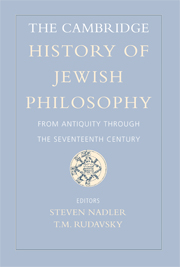Book contents
- Frontmatter
- Introduction
- 1 Texts and Contexts
- II Logic and Language
- III Natural Philosophy
- IV Epistemology and Psychology
- 14 Belief, Knowledge, and Certainty
- 15 Understanding Prophecy: Four Traditions
- 16 Soul and Intellect
- V Metaphysics and Philosophical Theology
- VI Practical Philosophy
- Biobibliographical Appendix
- Bibliography
- Index
- References
15 - Understanding Prophecy: Four Traditions
from IV - Epistemology and Psychology
Published online by Cambridge University Press: 28 May 2009
- Frontmatter
- Introduction
- 1 Texts and Contexts
- II Logic and Language
- III Natural Philosophy
- IV Epistemology and Psychology
- 14 Belief, Knowledge, and Certainty
- 15 Understanding Prophecy: Four Traditions
- 16 Soul and Intellect
- V Metaphysics and Philosophical Theology
- VI Practical Philosophy
- Biobibliographical Appendix
- Bibliography
- Index
- References
Summary
INTRODUCTION
For untold generations, whenever Jews gather in worship to read from the Torah and the Prophets, they praise God for having given them a “Torah of truth” and for having “chosen good prophets and taken pleasure in their words, which were spoken truthfully.” At a minimum, these words expressed a widespread confidence that the scrolls about to be read contained no falsehoods, lies, or outright fabrications about God, about divine interactions with humanity in general and Israel in particular, about what God requires as expressed in the commandments of the Torah and the teachings of the prophets, and, finally, about the worthiness and truthfulness of God’s chosen messengers. For many, no doubt, this generalized confidence was a matter of the deepest conviction. For others, however, there appeared to be grounds for skepticism about various claims; from time to time, they evidently expressed their doubts, difficulties, and occasionally even outright denials. This may be inferred, in part, from the strictures recorded in the Mishnah, Sanhedrin, chapter 10, regarding those who have no share in the world to come, from the wide range of interpretive problems recorded in the Ancient Questions Concerning the Bible from the Cairo Genizah, and from the objections of Hiwi of Balkh regarding the propriety and credibility of numerous passages from the Torah. Even so, people’s underlying confidence in the truthfulness of the Torah and the Prophets remained largely, if unevenly, intact until the advent of modernity.
- Type
- Chapter
- Information
- The Cambridge History of Jewish PhilosophyFrom Antiquity through the Seventeenth Century, pp. 481 - 523Publisher: Cambridge University PressPrint publication year: 2008



